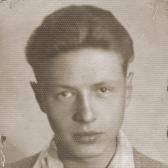
Welek grew up in Dabrowa Gornicza, an industrial town in western Poland. His father, Simcha, was a wholesale meat merchant and his mother, Rozalia, served as president of the local chapter of the Women’s International Zionist Organization. Welek’s older brother, Szlomo, was a dentist. The Luksenburgs were among the several thousand Jews who lived in Dabrowa Gornicza.
1933–39: Like many other children in the town, Welek attended public school. Because his family was very religious, he did not attend class on Saturdays in observance of the Sabbath. At school, Welek was beaten by his classmates and called a “Christ-Killer.” Local antisemites also mounted a boycott against Jewish stores in Dabrowa. When Welek was 16, German troops invaded Poland. On September 3, 1939, Dabrowa was occupied and Jews there were subjected to discriminatory laws. Furs and other valuable items were confiscated and Jewish businesses were identified, then seized.
1940–45: In 1941 German officials forced the town’s Jews into a ghetto. The following year, Welek’s parents were deported along with other Jews from Dabrowa to the Auschwitz-Birkenau killing center, where they perished. Szlomo was injured in forced labor and sent to the death camp. In March 1943, just a few months before the ghetto was liquidated, Welek was transported to the Blechhammer camp. Later, he was transferred to Gleiwitz, a labor camp that became part of the vast Auschwitz concentration camp network. There, he befriended Hinda Chilewicz, a fellow inmate. In January 1945, the prisoners were sent on a death march.
Welek and the other male prisoners were taken to the Sachsenhausen concentration camp and from there evacuated to the Flossenbürg and Regensburg camps. In May 1945, as U.S. troops approached, the SS abandoned the prisoners on a death march to Austria. A German farmer found Welek on the side of the road and turned him over to the Americans. In October 1945, he reunited with Hinda in Weiden, Germany. They were married on March 2, 1947.
Why I Volunteer
I am volunteering for the memory of my parents so they did not die in vain. I also want to teach others what hatred can do. For the pain in my heart and to save my heritage.







